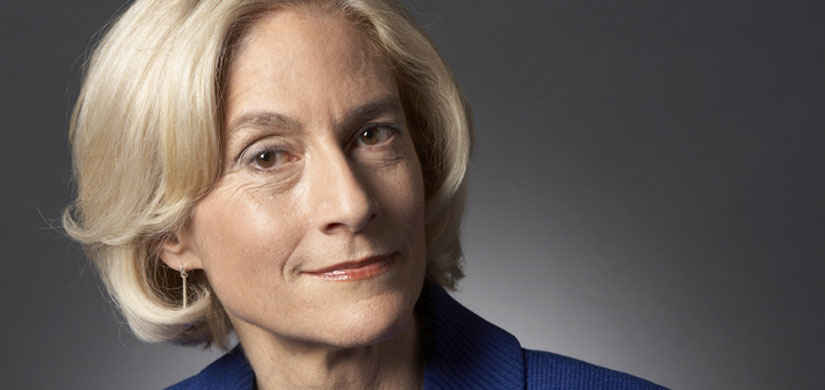You are in:
- Area of Communication and Media |
- Other News
Start of main content
Princess of Asturias Awards 05/15/2012
Martha C. Nussbaum 2012 Prince of Asturias Award for Social Sciences
The American philosopher Martha C. Nussbaum has been bestowed with the 2012 Prince of Asturias Award for Social Sciences, as made public today in Oviedo by the Jury responsible for conferring said Award.

©FPA
The Jury for the Award –convened by the Prince of Asturias Foundation– was chaired by Aurelio Menéndez Menéndez, Marquis of Ibias, and composed of Inés Alberdi Alonso, Lluis Xabel Álvarez Fernández, Gonzalo Anes y Álvarez de Castrillón, Marquis of Castrillón, Inés Fernández-Ordoñez Hernández, José Luis Garcia Delgado, Severino García Vigón, Mauro Guillén Rodríguez, María del Carmen Iglesias Cano, Adolfo Menéndez Menéndez, Manuel Menéndez Menéndez, Manuel Olivencia Ruiz, José Manuel Otero Novas, Carmen Pérez Die, Rafael Puyol Antolín and Juan Vázquez García (acting as secretary).
Born in New York (USA) in 1947, Martha Craven Nussbaum obtained her BA from NYU and was awarded a Ph.D. in Law and Ethics from Harvard in 1975. The founder and Coordinator of the Center for Comparative Constitutionalism, she is currently the Ernst Freund Distinguished Service Professor of Law and Ethics, appointed in the Philosophy Department, Law School and Divinity School of the University of Chicago, having taught at Harvard, Brown and Oxford.
Considered one of the most innovative and influential voices in philosophy today and an advocate of the role of the humanities in education, in her works Nussbaum propounds a universalist conception of women’s rights capable of overcoming the limits of cultural relativism.Her theories stem from the belief that people who understand good differently can agree on a number of universal ethical principles that are applicable wherever a situation of inequality and injustice arises. She has also put forward a constitutional and political framework which both respects local traditions and institutions and may give rise to political goals in specific contexts, thereby laying the ethical foundations for development aid.
Between 1986 and 1993, she was a research adviser at the World Institute for Development Economics Research (Helsinki, Finland), a part of the United Nations University. She has chaired the Committee on International Cooperation and the Committee on the Status of Women, both of the American Philosophical Association. She has been a member of the Council of the American Academy of Arts and Sciences and of the Board of the American Council of Learned Societies.
Among other works, she has written: Aristotle’s De MotuAnimalium (1978), Love’s Knowledge (1990), The Therapy of Desire (1994), Poetic Justice (1996), Sex and Social Justice (1998), Women and Human Development (2000), Upheavals of Thought: The Intelligence of Emotions (2001), Hiding from Humanity: Disgust, Shame and the Law (2004), Frontiers of Justice: Disability, Nationality, Species Membership (2006), The Clash Within: Democracy, Religious Violence and India’s Future (2007), Liberty of Conscience: In Defense of America’s Tradition of Religious Equality (2008), From Disgust to Humanity: Sexual Orientation and Constitutional Law (2010), Not For Profit: Why Democracy Needs the Humanities (2010) and Creating Capabilities: The Human Development Approach (2011).
Member of the Academy of Finland and Corresponding Fellow of the British Academy (2008), she holds honorary degrees from more than thirty universities in the United States, Canada, Asia and Europe. Among the awards she has received are the Brandeis Creative Arts Award in Non-Fiction (1990), the PEN Spielvogel-Diamondstein Award for the best collection of essays (1991), the Ness Book Award of the American Association of Colleges and Universities (1998), the Book Award of the North American Society of Social Philosophy (2000), for Sex and Social Justice, the Grawemeyer Award in Education (2002), the Distinguished Alumni Award from the University of New York (2000), the Barnard College Medal of Distinction (2003), the Professional and Scholarly Book Award for Law from the Association of American University Publishers (2004), the Redcliffe Alumnae Recognition Award (2007), the A.SK Social Science Award of the Social Science Research Center Berlin (2009), and the Henry M. Phillips Prize in Jurisprudence from the American Philosophical Society (2009).
According to the Statutes of the Foundation, the Prince of Asturias Awards aim “to reward the scientific, technical, cultural, social and humanistic work performed at an international level by individuals, institutions or groups of individuals or institutions”. As part of this spirit, the Prince of Asturias Award for Social Sciences shall be conferred on those “whose creative work or research in the fields of History, Law, Linguistics, Education, Political Science, Psychology, Sociology, Ethics, Philosophy, Geography, Economics, Demography or Anthropology, including the disciplines corresponding to each of these fields, constitutes a significant contribution to the benefit of Mankind”.
This year a total of 27 candidatures from Argentina, France, Germany, Israel, Italy, Kenya, Morocco, Mexico, Portugal, Switzerland, Turkey, United Kingdom, United States and Spain ran for the Award.
This is the second of eight Prince of Asturias Awards to be bestowed this year for the thirty-second time. The Prince of Asturias Award for the Arts went to Spanish architect Rafael Moneo.The rest of awards will be announced in the coming weeks in the following order: Communication and Humanities, Technical and Scientific Research, Literature and International Cooperation, with the Sports and Concord awards being announced in September.
Each Prince of Asturias Award, which date back to 1981, comprises a diploma, a Joan Miró sculpture representing and symbolising the Awards, an insignia bearing the Foundation's coat of arms, and a cash prize of 50,000 Euros. The awards will be presented in the autumn in Oviedo at a grand ceremony chaired by H.R.H. the Prince of Asturias.
End of main content
Sección de utilidades
Fin de la sección de utilidades
- Legal document Legal document (Access key 8)
- | Privacy policy Privacy policy (Access key )
- | Social networks ???en.portal.pie.menu107.title???
- | Cookies ???en.portal.pie.menu110.title???
- | Site map Site Map (Access key 3)
- | Contact Contact (Access key )
- | XHTML 1.0
- | CSS 2.1
- | WAI 'AA
© Copyright 2024. FUNDACIÓN PRINCESA DE ASTURIAS





